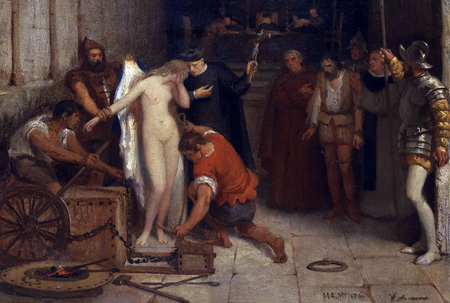There’s a simple reason why so many Christians oppose abortion and it has nothing to do with biology, as it is founded purely on theology. Old theology at that — the Protestants are following the Catholics without a quibble on this issue.
The basis is the question: when does the human soul enter a developing baby? Is it at conception, after the heart starts, sometime during gestation, or even at the drawing of the baby’s first breath?
All these different times have been proposed and vigorously defended by various thinkers. The Roman Church settled on conception – the very moment of fertilization – to settle the question of when Jesus became Christ. They decided that Jesus’ soul must have entered his body (along with the Holy Spirit) at the very instant of conception, because they could not handle the idea that there was a time that Jesus was not the Son of God.
The reason is the heresy called Adoptionism. Many early Christians felt that Jesus became the Son of God at the moment he was baptized by John and the dove descended upon him. After all, in Luke’s story of his baptism, when God confirms Jesus is his son: And a voice came from heaven, “You are my Son, the Beloved; with you I am well pleased.” [Luke 3:22] Some early texts read: “You are my Son, today I have begotten you.” [Emph. added]
This became a very big deal in the early centuries of Christianity as believers tried to figure out the relationship of God, Jesus, and later, the Spirit. If Jesus was “adopted”, it means he’s a lesser being than God. Thus, the entire bizarre and complicated doctrine of the Trinity was at stake.
If souls enter bodies at fertilization, then any intervention to stop them from developing and being born – abortion or even birth control – becomes indistinguishable from infanticide, murdering babies. Not only that but in-vitro fertilization and other procedures that circumvent normal biology that create embryos that cannot be brought to term are also tainted.
What about identical twins? Since they come from a single embryo that split into two, do they have two souls or only one? My youngest brothers are identical twins, and when they were young, it was easy to imagine that they had a single soul in common (especially when they ganged up on me). They shared so much that they were virtually telepathic with each other, for one thing. Yet I never had trouble telling them apart. And as they grew, they blossomed into quite different individuals with unique talents and characteristics despite their continued closeness.
Or what about fetuses that are absorbed by their twin? Some living people are actual “mosaics” with types of cells from more than one individual. Obviously, the whole doctrine needs more thought, as individuation is a mystery that defies easy solution. (For that matter, where did Jesus’ masculine chromosome come from? Being male, there is no way he could have been a clone of Mary, after all, and if it wasn’t Joseph’s…)
In any case, the Church decided Jesus was God from the get-go, which solved that problem with the Holy Trinity but left another question still unanswered. If Jesus was God all his life, then he possessed divine powers all that time. Maybe those discarded gospels that showed him as a kid making a teacher blind or creating living birds out of clay had a basis in fact.
Moreover, if Jesus was thoroughly God as well as man all the time, he was a mighty superhero. After all, he could walk on water and fly. Jesus could command weather and demons, heal at will, and walk through walls. Maybe he did not even feel pain. The Crucifixion would have just been a show; he could have come down from the cross anytime. And he could look different any time he wanted to…
Maybe the question of their semi-divine status is one reason why the Church refused to tolerate the idea that Jesus could have fathered children. But beyond all such speculation, the Church’s insistence that life is holy may have been twisted by arrogant prelates claiming moral superiority over laypeople, but it is not entirely wrong. Life is a precious gift and people should be wary about tampering with its awesome power. But the attitude of many is that God approves of suffering, that it is somehow good for us. Therefore generations of believers have accepted loveless marriages, sexual abuse, and tragically-deformed children.
What would Jesus do? How did Christ think about all these issues? Unanswerable as that is, it’s just the beginning. What about cloning? Genetic engineering?
Then there are profoundly personal sexual issues such as homosexuality and transgenderism. There’s not enough space here even to begin to touch on such subjects, nor the difficulty they present to traditional theology.
God, in the Old Testament, was apparently not very fond of sex but allowed it for reproduction, along with polygamy and divorce. Jesus, with his irregular birth, was quite firmly against divorce, but not much else was recorded on how he felt about sex and marriage. That could easily open a can of worms involving his own birth that for whatever reasons, the early Church did not want to deal with.
Yet, all too many Christians forget Jesus’ basic love and acceptance of humanity with all its many flaws. He taught that true humane morality must be always be tempered with compassion. And so, a basic principle of theology is that less evil options are to be preferred to worse evils. That is, for example, why the Catholic Church has always tolerated red-light districts — because prostitution was less heinous than rape, adultery, and incest.
Is terminating a fetus always worse than allowing an unloved or profoundly diminished life to be born? Is suicide better than a life of helpless agony? There are no easy answers but I don’t think so. I believe that every person must answer for themselves and have the basic decency and humility not to impose their solution on everyone else.

